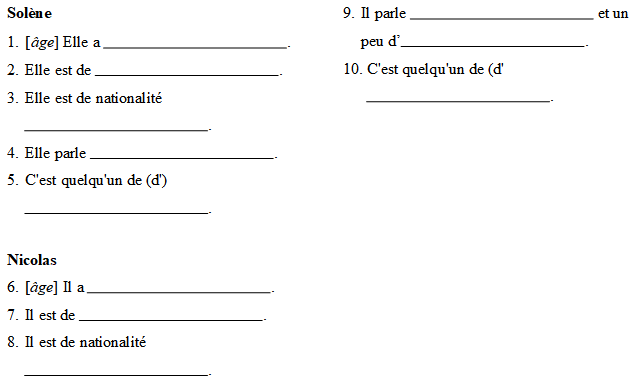Tuo padre non vuole parlare ai tuoi parenti.*
Le seguenti persone sono pigre e non vogliono fare niente per Pasqua. Scrivi delle
frasi imperative, usando anche i pronomi diretti, indiretti o riflessivi. (The following people are lazy and don’t want to do anything this Easter. Write the appropriate command with the correct direct, indirect, or reflexive pronoun.)
Parla loro! / Parlagli!
You might also like to view...
The speakers were _____, and the meal was planned _____
a. good, good b. well, well c. well, good d. good, well
¡Qué semana excelente! Esta semana fue increíble para ti. Llena el espacio en blanco con la forma correcta del verbo apropiado para describir lo que pasó. (¡OJO! Remember that your answers must include verbs conjugated in the preterite. Do not repeat any verbs.) ¡Qué fantástica semana! Primero, yo (saber / poner) (1) _____________________ que gané doscientos dólares en una lotería de mi trabajo el viernes. Después, yo (saber / llamar) (2) _______________________ a Alicia para invitarla a un concierto el sábado. Al llegar al concierto, nosotros (poder / saber) (3) _____________________ conocer al cantante del grupo. Además, él nos (recibir / dar) (4) _____________________ un par de boletos para otro concierto el martes. El martes Alicia y yo asistimos a ese concierto y
después fuimos a una fiesta inolvidable en que [nosotros] (sentarse / divertirse) (5) ____________________ muchísimo bailando. ¡Fue genial!(3) Fill in the blank(s) with the appropriate word(s).
Compréhension auditive
Première étape.
Listen as your instructor describes Solène, then Nicolas. Complete each sentence about them based on what you hear.
 figure 1.png)

Deuxième étape.
Using the information in the “Première étape” as a model, answer the following questions using a complete sentence.
1. Quel âge avez-vous? __________________________________________.
2. Quelle est votre nationalité? __________________________________________.
3. Quelle(s) langue(s) parlez-vous? __________________________________________.
College students who use their phones often make better grades than their peers who use theirs less often.
a. true b. false